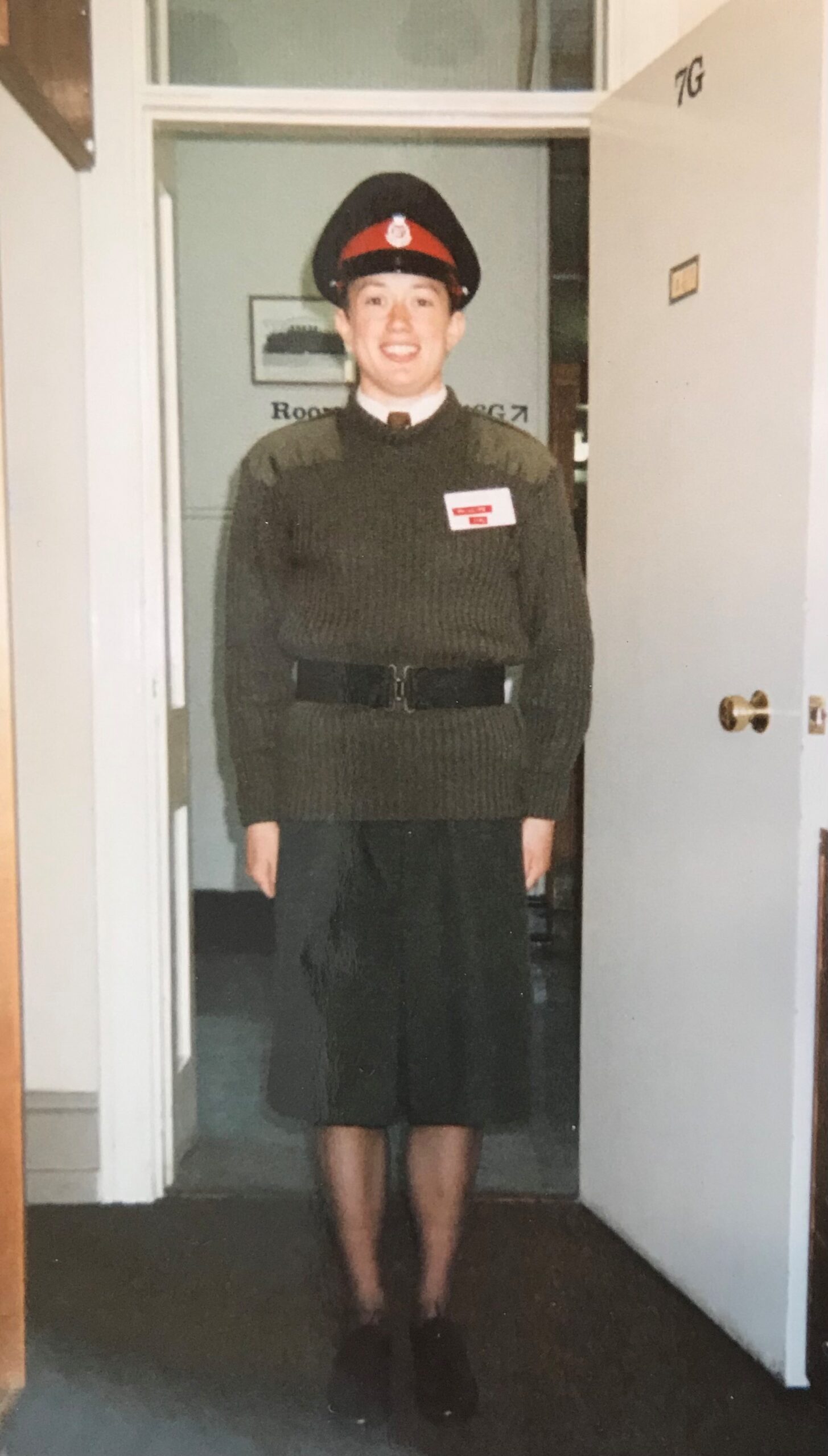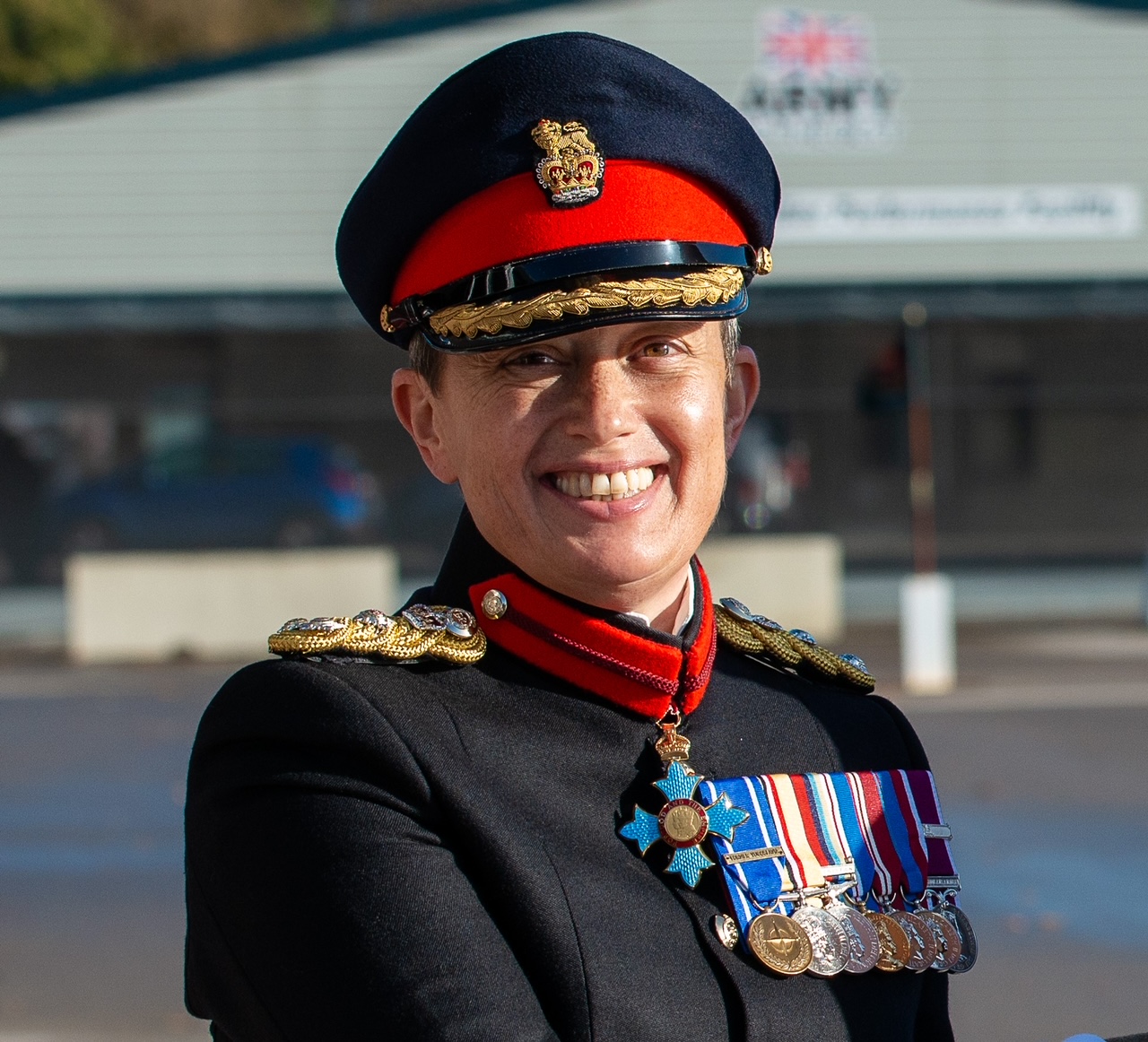
Clare Phillips CBE (She/Her) – Brigadier British Army and Senior Representative of the Army LGBTQ+ Network
Joining the Army as a naïve 22 year old in 1995, I didn’t really think about my sexuality. I knew I was gay but the whole topic of sexuality held such a taboo that I hadn’t discussed it with anyone and I don’t recall having a conscious understanding that an Army career could be cut short because someone was gay. I had always played lots of sport and was (still am) a trouser wearing, short haired, make-up avoiding type of woman so I imagine many would have assumed my sexuality long before I had even thought about it!
The ‘gay ban’ and its potential impact on my career first became a factor during my officer training at the Royal Military Academy at Sandhurst. There were whispers in corridors and frowns at my short hair cut (which actually saved a lot of time after showers… ) but that didn’t feel particularly different from any other work place where gay relationships were simply not a topic of conversation. In an attempt to divert attention, I had a photograph of a fake boyfriend pinned to the notice board in my room and very carefully hid letters from my girlfriend in my car to avoid discovery during room inspections. It always felt a shame not to be able to join in conversations about who was doing what over a long weekend or leave period but beyond that, the ban didn’t feel particularly real.
I moved to my first unit in Germany and deployed to Bosnia for my first operational tour. I had the most fabulous time with incredible people – by this time I was single and simply enjoying being a junior officer with brilliant soldiers, learning about the Army and myself as a leader. It was only when I returned to Germany and, through a chance encounter on a rugby pitch, I found myself in a new relationship. She has been in the Army slightly longer than me and had built up a network of gay women as friends. It was through those women that I learnt about the true risks of the ban – the snap room inspections, the interviews, the records being kept, the investigations and the sudden disappearance of loved ones, friends and colleagues. There was a palpable sense of fear and jeopardy. There was also a powerful sense of community – our shared fear bound us together into a tight network. After all, we couldn’t share our lives with anyone else. The irony was that the Army’s policy was creating the very fighting spirit that our very presence was meant to destroy. To those women, many of whom became lifelong friends, I thank you for your acceptance, brutally dark humour and your protection – I was a daft junior officer who would have been in so much trouble if it hadn’t been for your guidance.

Then the ban lifted in 2000 and the change began. Slowly at first – so very, very slowly – a change in policy can’t change longstanding and deep-set opinions overnight. But change came. At first, I kept my secret. Then person by person, I made an individual assessment of who I could trust and how much. I moved from “don’t tell”, to “tell if asked” and eventually to “just tell”. In 2007, I remember telling my new CO that I lived with my girlfriend, Nicky. I told him and then immediately looked away so that if he needed time to look shocked, he could regather himself without me seeing – to protect him. (He wasn’t shocked…. I refer you back to short hair and trouser wearing….). Several years later, I stood shoulder to shoulder with the Army’s senior soldier and officer discussing my role the previous weekend leading the Army contingent at London Pride – they thanked me for my contribution and pledged to join us the following year (which they did).
The impact of acceptance really struck me when I was commanding my unit in 2014. I was about to go on leave for a couple of weeks – but this was no ordinary leave period, Nicky and I were getting married. My leadership team knocked me off my feet when they presented me with a wedding present – a set of beautiful champagne glasses. The gift was incredibly generous but it paled into insignificance compared to the meaning behind it – I was loved, I was seen and I was accepted – we were accepted. The room always gets a little dusty when I think about that moment. I feel desperately fortunate. Certainly by luck and the care of others rather than my own good judgement, I survived the gay ban and my career has flourished. Far more importantly, my life has flourished – my friendships are deep and my love for my colleagues reciprocated through our honest, shared, open experiences.
I look back on the 30 years of my Army career with a deep sense of connection, happiness and pride. I compare the comparative shallowness of the early years where I could only be half of my true self, with the full-bodied immersion of all that followed from 2000 onwards. Feeling the love and acceptance of my fellow service personnel for all that I truly am, has driven me to be the very best officer that I could be – for them.
I stand on the shoulders of giants – those who went before me to fight for justice for our veterans and to fight for the rights of the LGBTQ+ community to serve their country with dignity, courage and pride. Our country is stronger and safer because of their service and sacrifice. My abiding message to those giants will always be: thank you for my service.